Impact of National Culture on Acceptance of Organizational Change
VerifiedAdded on 2021/04/21
|13
|2909
|94
Essay
AI Summary
This essay examines the impact of national culture on the acceptance and implementation of organizational change programs. It begins by defining organizational change and the sources of power within organizations, drawing on French and Raven's framework. The essay then explores the positive and negative aspects of power utilization in change initiatives, emphasizing the importance of employee involvement and respect. The core of the analysis focuses on Geert Hofstede's cultural dimensions (power distance, uncertainty avoidance, individualism-collectivism, masculinity-femininity, and Confucianism) and how these dimensions influence the use and acceptance of power in different national contexts. A comparative analysis of Australia and Singapore is presented, highlighting how cultural differences affect power dynamics, leadership styles, and the success of change management strategies. The essay concludes by emphasizing the significant role of national culture in shaping organizational change processes and the need for managers to consider cultural nuances when implementing change initiatives.
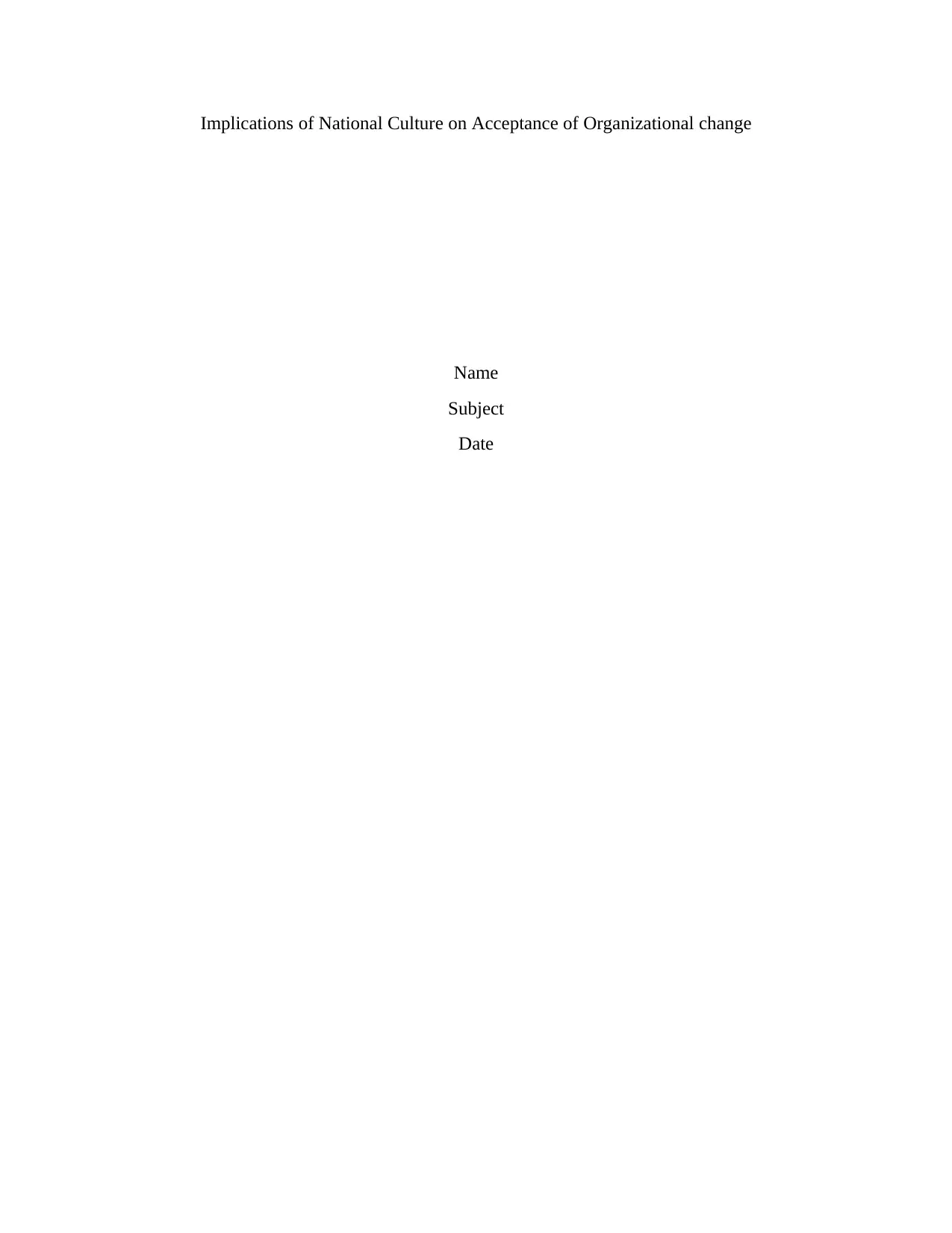
Implications of National Culture on Acceptance of Organizational change
Name
Subject
Date
Name
Subject
Date
Paraphrase This Document
Need a fresh take? Get an instant paraphrase of this document with our AI Paraphraser
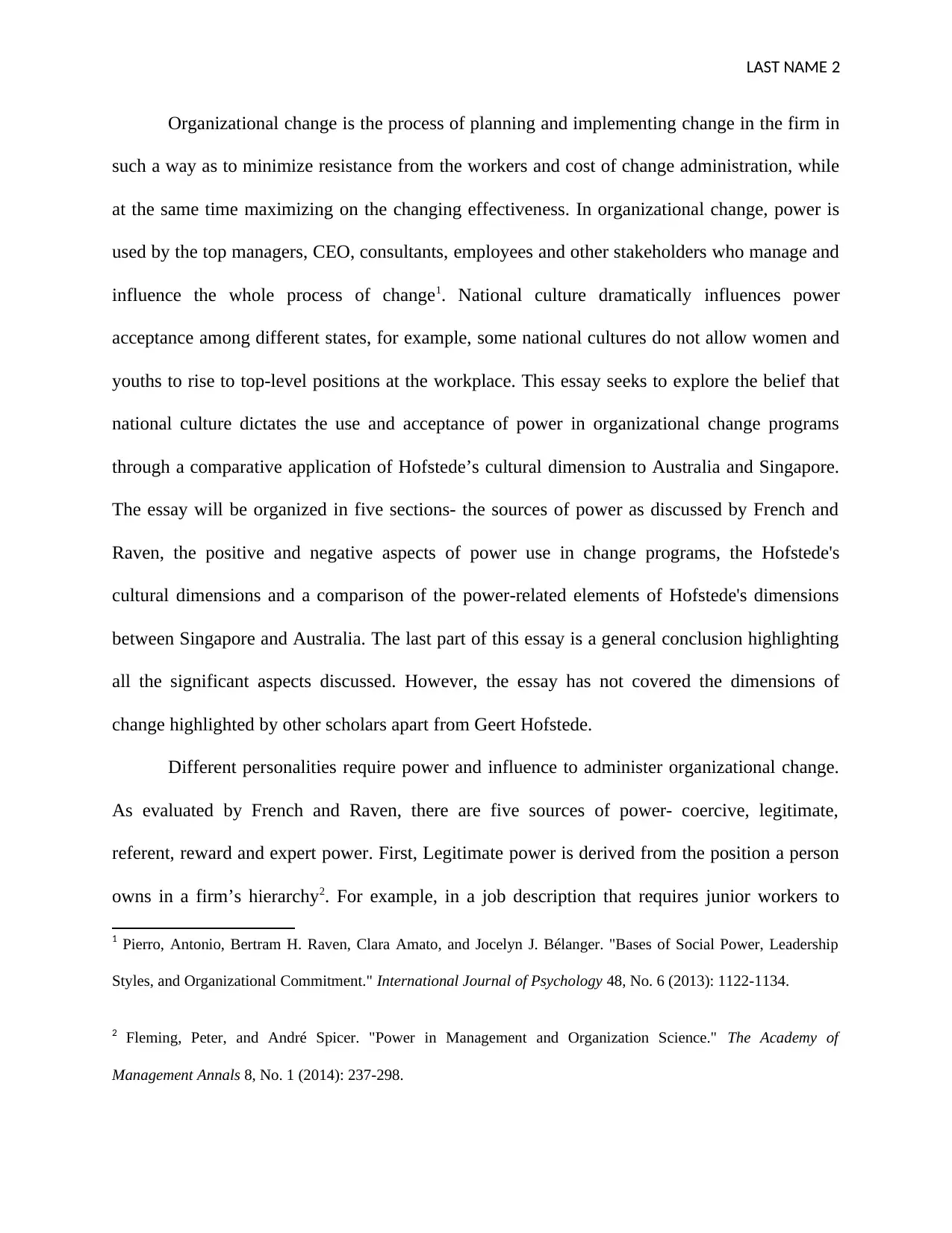
LAST NAME 2
Organizational change is the process of planning and implementing change in the firm in
such a way as to minimize resistance from the workers and cost of change administration, while
at the same time maximizing on the changing effectiveness. In organizational change, power is
used by the top managers, CEO, consultants, employees and other stakeholders who manage and
influence the whole process of change1. National culture dramatically influences power
acceptance among different states, for example, some national cultures do not allow women and
youths to rise to top-level positions at the workplace. This essay seeks to explore the belief that
national culture dictates the use and acceptance of power in organizational change programs
through a comparative application of Hofstede’s cultural dimension to Australia and Singapore.
The essay will be organized in five sections- the sources of power as discussed by French and
Raven, the positive and negative aspects of power use in change programs, the Hofstede's
cultural dimensions and a comparison of the power-related elements of Hofstede's dimensions
between Singapore and Australia. The last part of this essay is a general conclusion highlighting
all the significant aspects discussed. However, the essay has not covered the dimensions of
change highlighted by other scholars apart from Geert Hofstede.
Different personalities require power and influence to administer organizational change.
As evaluated by French and Raven, there are five sources of power- coercive, legitimate,
referent, reward and expert power. First, Legitimate power is derived from the position a person
owns in a firm’s hierarchy2. For example, in a job description that requires junior workers to
1 Pierro, Antonio, Bertram H. Raven, Clara Amato, and Jocelyn J. Bélanger. "Bases of Social Power, Leadership
Styles, and Organizational Commitment." International Journal of Psychology 48, No. 6 (2013): 1122-1134.
2 Fleming, Peter, and André Spicer. "Power in Management and Organization Science." The Academy of
Management Annals 8, No. 1 (2014): 237-298.
Organizational change is the process of planning and implementing change in the firm in
such a way as to minimize resistance from the workers and cost of change administration, while
at the same time maximizing on the changing effectiveness. In organizational change, power is
used by the top managers, CEO, consultants, employees and other stakeholders who manage and
influence the whole process of change1. National culture dramatically influences power
acceptance among different states, for example, some national cultures do not allow women and
youths to rise to top-level positions at the workplace. This essay seeks to explore the belief that
national culture dictates the use and acceptance of power in organizational change programs
through a comparative application of Hofstede’s cultural dimension to Australia and Singapore.
The essay will be organized in five sections- the sources of power as discussed by French and
Raven, the positive and negative aspects of power use in change programs, the Hofstede's
cultural dimensions and a comparison of the power-related elements of Hofstede's dimensions
between Singapore and Australia. The last part of this essay is a general conclusion highlighting
all the significant aspects discussed. However, the essay has not covered the dimensions of
change highlighted by other scholars apart from Geert Hofstede.
Different personalities require power and influence to administer organizational change.
As evaluated by French and Raven, there are five sources of power- coercive, legitimate,
referent, reward and expert power. First, Legitimate power is derived from the position a person
owns in a firm’s hierarchy2. For example, in a job description that requires junior workers to
1 Pierro, Antonio, Bertram H. Raven, Clara Amato, and Jocelyn J. Bélanger. "Bases of Social Power, Leadership
Styles, and Organizational Commitment." International Journal of Psychology 48, No. 6 (2013): 1122-1134.
2 Fleming, Peter, and André Spicer. "Power in Management and Organization Science." The Academy of
Management Annals 8, No. 1 (2014): 237-298.
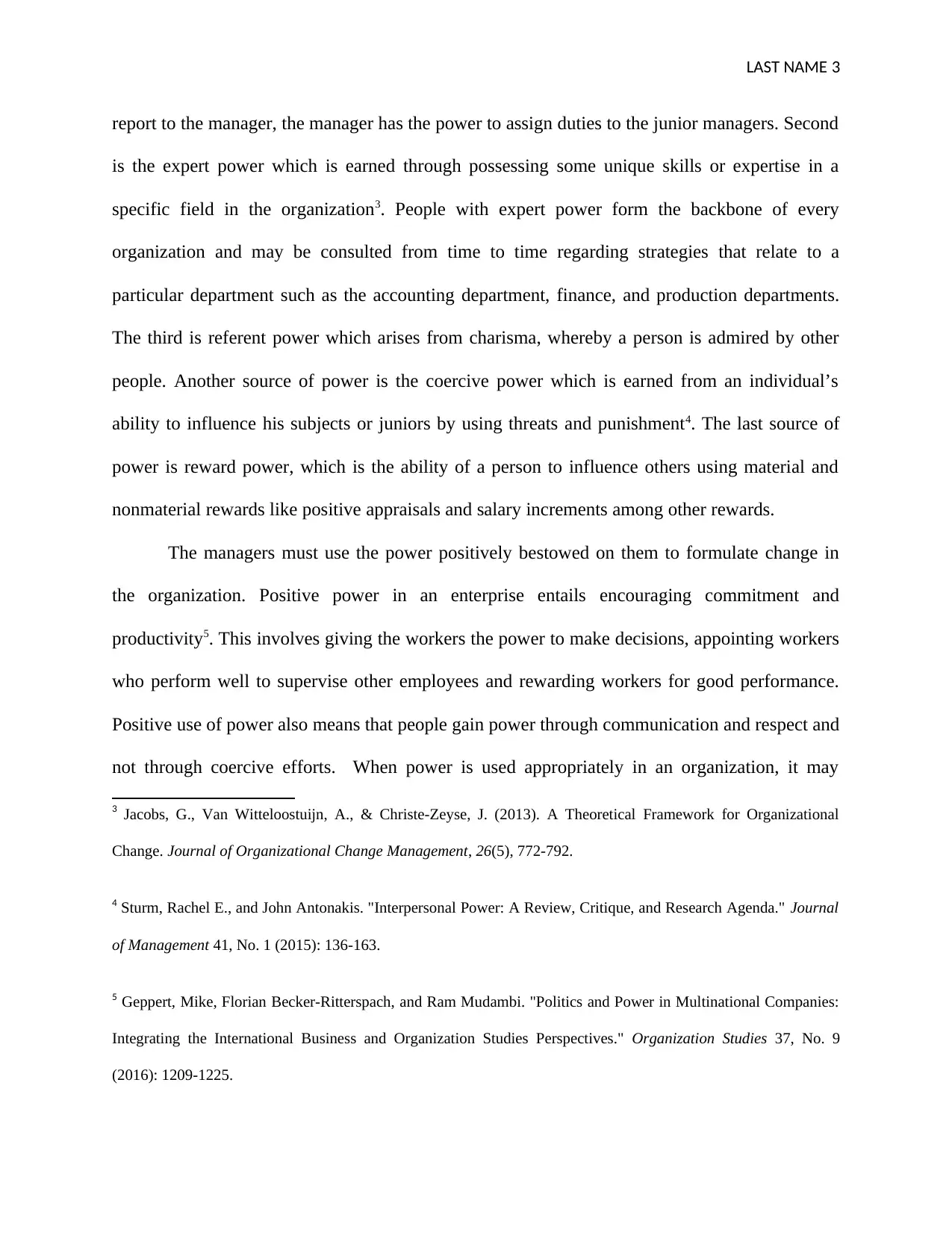
LAST NAME 3
report to the manager, the manager has the power to assign duties to the junior managers. Second
is the expert power which is earned through possessing some unique skills or expertise in a
specific field in the organization3. People with expert power form the backbone of every
organization and may be consulted from time to time regarding strategies that relate to a
particular department such as the accounting department, finance, and production departments.
The third is referent power which arises from charisma, whereby a person is admired by other
people. Another source of power is the coercive power which is earned from an individual’s
ability to influence his subjects or juniors by using threats and punishment4. The last source of
power is reward power, which is the ability of a person to influence others using material and
nonmaterial rewards like positive appraisals and salary increments among other rewards.
The managers must use the power positively bestowed on them to formulate change in
the organization. Positive power in an enterprise entails encouraging commitment and
productivity5. This involves giving the workers the power to make decisions, appointing workers
who perform well to supervise other employees and rewarding workers for good performance.
Positive use of power also means that people gain power through communication and respect and
not through coercive efforts. When power is used appropriately in an organization, it may
3 Jacobs, G., Van Witteloostuijn, A., & Christe-Zeyse, J. (2013). A Theoretical Framework for Organizational
Change. Journal of Organizational Change Management, 26(5), 772-792.
4 Sturm, Rachel E., and John Antonakis. "Interpersonal Power: A Review, Critique, and Research Agenda." Journal
of Management 41, No. 1 (2015): 136-163.
5 Geppert, Mike, Florian Becker-Ritterspach, and Ram Mudambi. "Politics and Power in Multinational Companies:
Integrating the International Business and Organization Studies Perspectives." Organization Studies 37, No. 9
(2016): 1209-1225.
report to the manager, the manager has the power to assign duties to the junior managers. Second
is the expert power which is earned through possessing some unique skills or expertise in a
specific field in the organization3. People with expert power form the backbone of every
organization and may be consulted from time to time regarding strategies that relate to a
particular department such as the accounting department, finance, and production departments.
The third is referent power which arises from charisma, whereby a person is admired by other
people. Another source of power is the coercive power which is earned from an individual’s
ability to influence his subjects or juniors by using threats and punishment4. The last source of
power is reward power, which is the ability of a person to influence others using material and
nonmaterial rewards like positive appraisals and salary increments among other rewards.
The managers must use the power positively bestowed on them to formulate change in
the organization. Positive power in an enterprise entails encouraging commitment and
productivity5. This involves giving the workers the power to make decisions, appointing workers
who perform well to supervise other employees and rewarding workers for good performance.
Positive use of power also means that people gain power through communication and respect and
not through coercive efforts. When power is used appropriately in an organization, it may
3 Jacobs, G., Van Witteloostuijn, A., & Christe-Zeyse, J. (2013). A Theoretical Framework for Organizational
Change. Journal of Organizational Change Management, 26(5), 772-792.
4 Sturm, Rachel E., and John Antonakis. "Interpersonal Power: A Review, Critique, and Research Agenda." Journal
of Management 41, No. 1 (2015): 136-163.
5 Geppert, Mike, Florian Becker-Ritterspach, and Ram Mudambi. "Politics and Power in Multinational Companies:
Integrating the International Business and Organization Studies Perspectives." Organization Studies 37, No. 9
(2016): 1209-1225.
⊘ This is a preview!⊘
Do you want full access?
Subscribe today to unlock all pages.

Trusted by 1+ million students worldwide
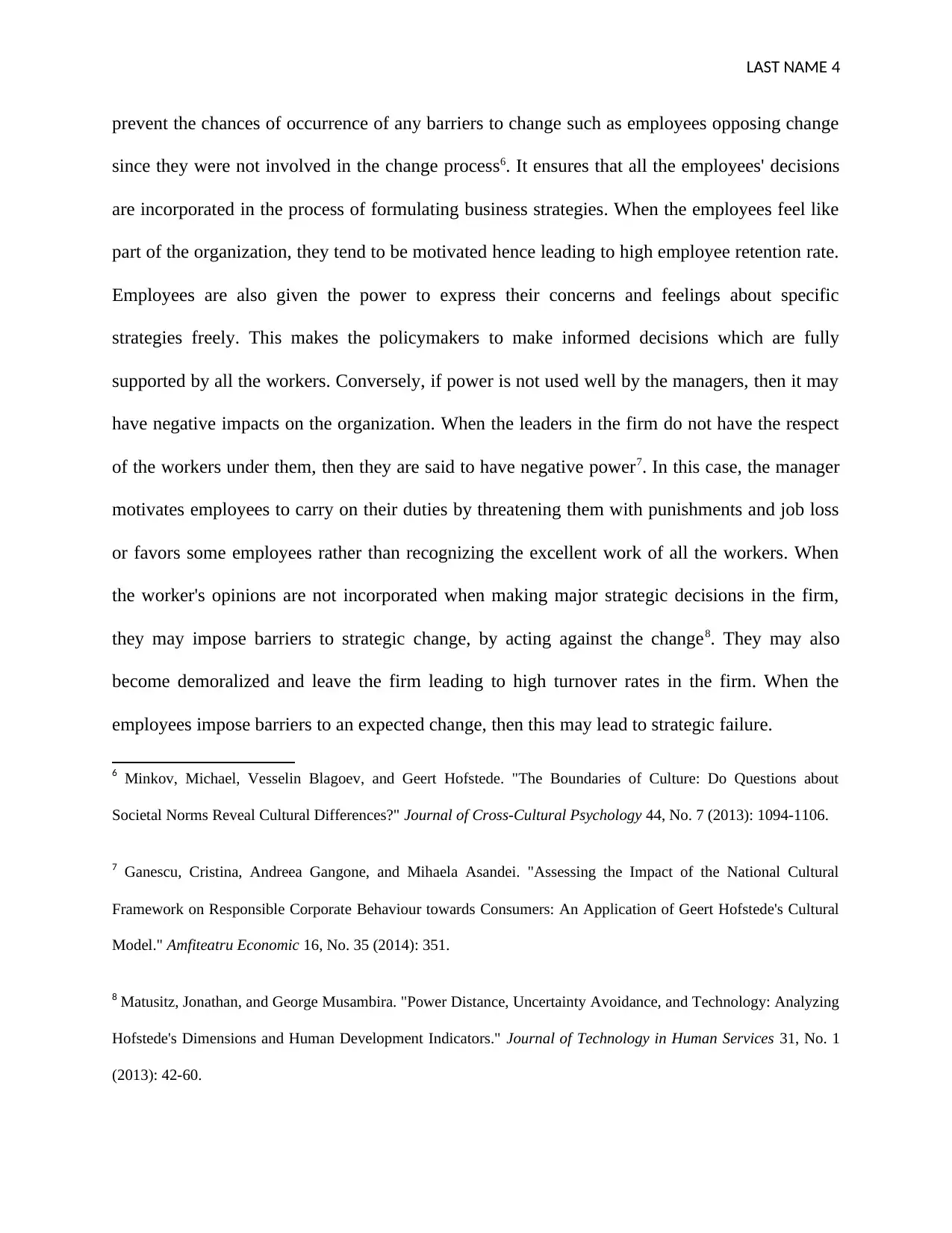
LAST NAME 4
prevent the chances of occurrence of any barriers to change such as employees opposing change
since they were not involved in the change process6. It ensures that all the employees' decisions
are incorporated in the process of formulating business strategies. When the employees feel like
part of the organization, they tend to be motivated hence leading to high employee retention rate.
Employees are also given the power to express their concerns and feelings about specific
strategies freely. This makes the policymakers to make informed decisions which are fully
supported by all the workers. Conversely, if power is not used well by the managers, then it may
have negative impacts on the organization. When the leaders in the firm do not have the respect
of the workers under them, then they are said to have negative power7. In this case, the manager
motivates employees to carry on their duties by threatening them with punishments and job loss
or favors some employees rather than recognizing the excellent work of all the workers. When
the worker's opinions are not incorporated when making major strategic decisions in the firm,
they may impose barriers to strategic change, by acting against the change8. They may also
become demoralized and leave the firm leading to high turnover rates in the firm. When the
employees impose barriers to an expected change, then this may lead to strategic failure.
6 Minkov, Michael, Vesselin Blagoev, and Geert Hofstede. "The Boundaries of Culture: Do Questions about
Societal Norms Reveal Cultural Differences?" Journal of Cross-Cultural Psychology 44, No. 7 (2013): 1094-1106.
7 Ganescu, Cristina, Andreea Gangone, and Mihaela Asandei. "Assessing the Impact of the National Cultural
Framework on Responsible Corporate Behaviour towards Consumers: An Application of Geert Hofstede's Cultural
Model." Amfiteatru Economic 16, No. 35 (2014): 351.
8 Matusitz, Jonathan, and George Musambira. "Power Distance, Uncertainty Avoidance, and Technology: Analyzing
Hofstede's Dimensions and Human Development Indicators." Journal of Technology in Human Services 31, No. 1
(2013): 42-60.
prevent the chances of occurrence of any barriers to change such as employees opposing change
since they were not involved in the change process6. It ensures that all the employees' decisions
are incorporated in the process of formulating business strategies. When the employees feel like
part of the organization, they tend to be motivated hence leading to high employee retention rate.
Employees are also given the power to express their concerns and feelings about specific
strategies freely. This makes the policymakers to make informed decisions which are fully
supported by all the workers. Conversely, if power is not used well by the managers, then it may
have negative impacts on the organization. When the leaders in the firm do not have the respect
of the workers under them, then they are said to have negative power7. In this case, the manager
motivates employees to carry on their duties by threatening them with punishments and job loss
or favors some employees rather than recognizing the excellent work of all the workers. When
the worker's opinions are not incorporated when making major strategic decisions in the firm,
they may impose barriers to strategic change, by acting against the change8. They may also
become demoralized and leave the firm leading to high turnover rates in the firm. When the
employees impose barriers to an expected change, then this may lead to strategic failure.
6 Minkov, Michael, Vesselin Blagoev, and Geert Hofstede. "The Boundaries of Culture: Do Questions about
Societal Norms Reveal Cultural Differences?" Journal of Cross-Cultural Psychology 44, No. 7 (2013): 1094-1106.
7 Ganescu, Cristina, Andreea Gangone, and Mihaela Asandei. "Assessing the Impact of the National Cultural
Framework on Responsible Corporate Behaviour towards Consumers: An Application of Geert Hofstede's Cultural
Model." Amfiteatru Economic 16, No. 35 (2014): 351.
8 Matusitz, Jonathan, and George Musambira. "Power Distance, Uncertainty Avoidance, and Technology: Analyzing
Hofstede's Dimensions and Human Development Indicators." Journal of Technology in Human Services 31, No. 1
(2013): 42-60.
Paraphrase This Document
Need a fresh take? Get an instant paraphrase of this document with our AI Paraphraser
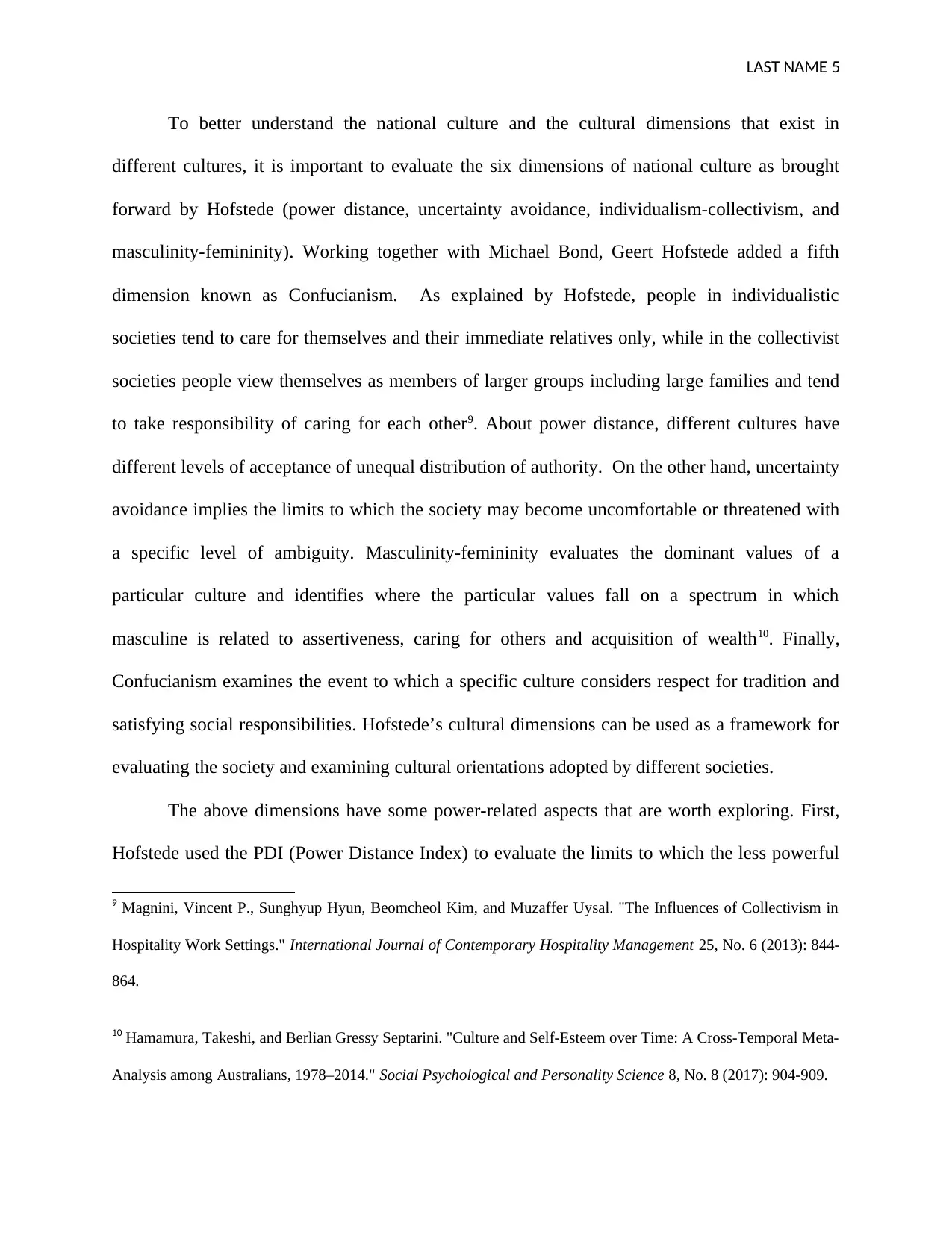
LAST NAME 5
To better understand the national culture and the cultural dimensions that exist in
different cultures, it is important to evaluate the six dimensions of national culture as brought
forward by Hofstede (power distance, uncertainty avoidance, individualism-collectivism, and
masculinity-femininity). Working together with Michael Bond, Geert Hofstede added a fifth
dimension known as Confucianism. As explained by Hofstede, people in individualistic
societies tend to care for themselves and their immediate relatives only, while in the collectivist
societies people view themselves as members of larger groups including large families and tend
to take responsibility of caring for each other9. About power distance, different cultures have
different levels of acceptance of unequal distribution of authority. On the other hand, uncertainty
avoidance implies the limits to which the society may become uncomfortable or threatened with
a specific level of ambiguity. Masculinity-femininity evaluates the dominant values of a
particular culture and identifies where the particular values fall on a spectrum in which
masculine is related to assertiveness, caring for others and acquisition of wealth10. Finally,
Confucianism examines the event to which a specific culture considers respect for tradition and
satisfying social responsibilities. Hofstede’s cultural dimensions can be used as a framework for
evaluating the society and examining cultural orientations adopted by different societies.
The above dimensions have some power-related aspects that are worth exploring. First,
Hofstede used the PDI (Power Distance Index) to evaluate the limits to which the less powerful
9 Magnini, Vincent P., Sunghyup Hyun, Beomcheol Kim, and Muzaffer Uysal. "The Influences of Collectivism in
Hospitality Work Settings." International Journal of Contemporary Hospitality Management 25, No. 6 (2013): 844-
864.
10 Hamamura, Takeshi, and Berlian Gressy Septarini. "Culture and Self-Esteem over Time: A Cross-Temporal Meta-
Analysis among Australians, 1978–2014." Social Psychological and Personality Science 8, No. 8 (2017): 904-909.
To better understand the national culture and the cultural dimensions that exist in
different cultures, it is important to evaluate the six dimensions of national culture as brought
forward by Hofstede (power distance, uncertainty avoidance, individualism-collectivism, and
masculinity-femininity). Working together with Michael Bond, Geert Hofstede added a fifth
dimension known as Confucianism. As explained by Hofstede, people in individualistic
societies tend to care for themselves and their immediate relatives only, while in the collectivist
societies people view themselves as members of larger groups including large families and tend
to take responsibility of caring for each other9. About power distance, different cultures have
different levels of acceptance of unequal distribution of authority. On the other hand, uncertainty
avoidance implies the limits to which the society may become uncomfortable or threatened with
a specific level of ambiguity. Masculinity-femininity evaluates the dominant values of a
particular culture and identifies where the particular values fall on a spectrum in which
masculine is related to assertiveness, caring for others and acquisition of wealth10. Finally,
Confucianism examines the event to which a specific culture considers respect for tradition and
satisfying social responsibilities. Hofstede’s cultural dimensions can be used as a framework for
evaluating the society and examining cultural orientations adopted by different societies.
The above dimensions have some power-related aspects that are worth exploring. First,
Hofstede used the PDI (Power Distance Index) to evaluate the limits to which the less powerful
9 Magnini, Vincent P., Sunghyup Hyun, Beomcheol Kim, and Muzaffer Uysal. "The Influences of Collectivism in
Hospitality Work Settings." International Journal of Contemporary Hospitality Management 25, No. 6 (2013): 844-
864.
10 Hamamura, Takeshi, and Berlian Gressy Septarini. "Culture and Self-Esteem over Time: A Cross-Temporal Meta-
Analysis among Australians, 1978–2014." Social Psychological and Personality Science 8, No. 8 (2017): 904-909.
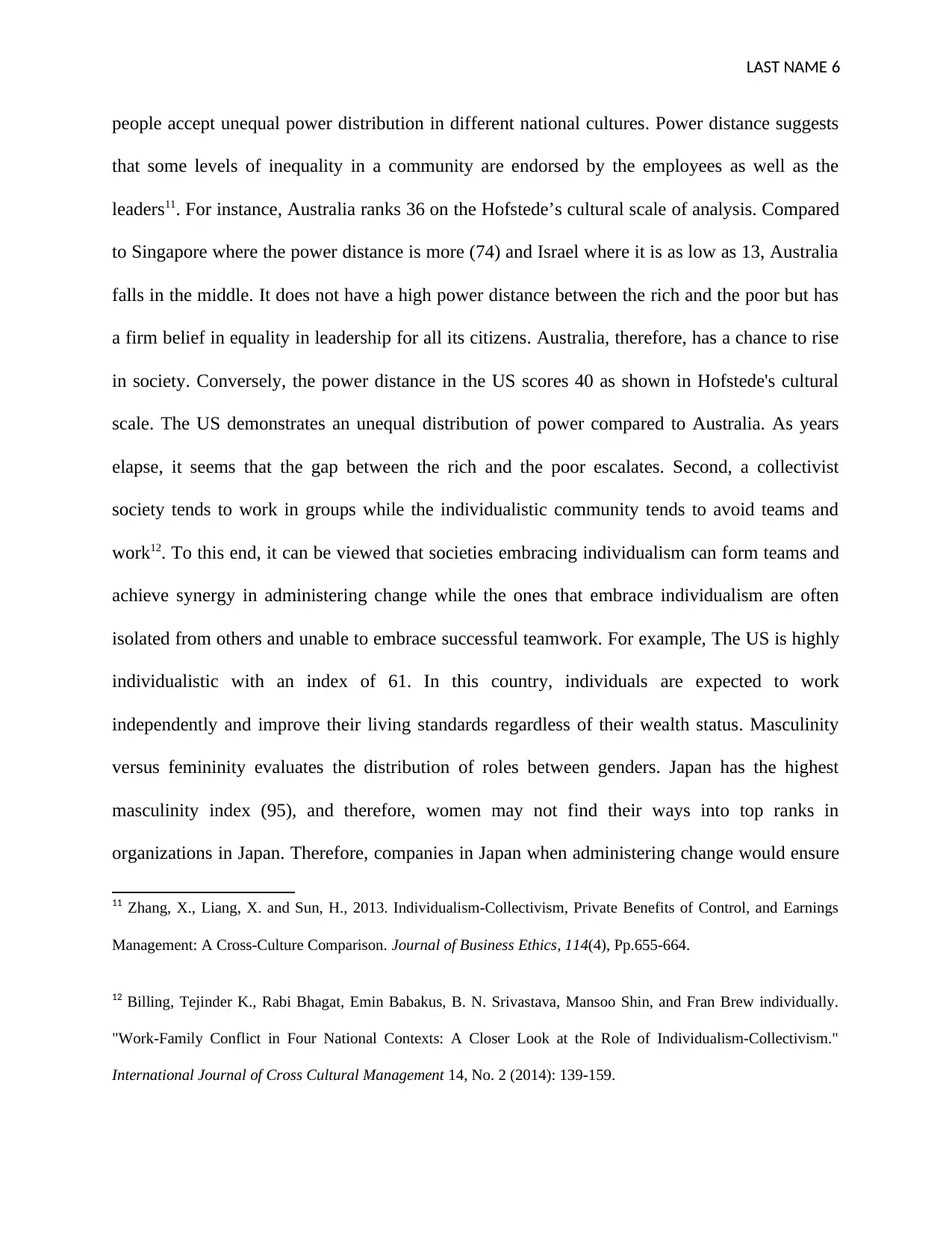
LAST NAME 6
people accept unequal power distribution in different national cultures. Power distance suggests
that some levels of inequality in a community are endorsed by the employees as well as the
leaders11. For instance, Australia ranks 36 on the Hofstede’s cultural scale of analysis. Compared
to Singapore where the power distance is more (74) and Israel where it is as low as 13, Australia
falls in the middle. It does not have a high power distance between the rich and the poor but has
a firm belief in equality in leadership for all its citizens. Australia, therefore, has a chance to rise
in society. Conversely, the power distance in the US scores 40 as shown in Hofstede's cultural
scale. The US demonstrates an unequal distribution of power compared to Australia. As years
elapse, it seems that the gap between the rich and the poor escalates. Second, a collectivist
society tends to work in groups while the individualistic community tends to avoid teams and
work12. To this end, it can be viewed that societies embracing individualism can form teams and
achieve synergy in administering change while the ones that embrace individualism are often
isolated from others and unable to embrace successful teamwork. For example, The US is highly
individualistic with an index of 61. In this country, individuals are expected to work
independently and improve their living standards regardless of their wealth status. Masculinity
versus femininity evaluates the distribution of roles between genders. Japan has the highest
masculinity index (95), and therefore, women may not find their ways into top ranks in
organizations in Japan. Therefore, companies in Japan when administering change would ensure
11 Zhang, X., Liang, X. and Sun, H., 2013. Individualism-Collectivism, Private Benefits of Control, and Earnings
Management: A Cross-Culture Comparison. Journal of Business Ethics, 114(4), Pp.655-664.
12 Billing, Tejinder K., Rabi Bhagat, Emin Babakus, B. N. Srivastava, Mansoo Shin, and Fran Brew individually.
"Work-Family Conflict in Four National Contexts: A Closer Look at the Role of Individualism-Collectivism."
International Journal of Cross Cultural Management 14, No. 2 (2014): 139-159.
people accept unequal power distribution in different national cultures. Power distance suggests
that some levels of inequality in a community are endorsed by the employees as well as the
leaders11. For instance, Australia ranks 36 on the Hofstede’s cultural scale of analysis. Compared
to Singapore where the power distance is more (74) and Israel where it is as low as 13, Australia
falls in the middle. It does not have a high power distance between the rich and the poor but has
a firm belief in equality in leadership for all its citizens. Australia, therefore, has a chance to rise
in society. Conversely, the power distance in the US scores 40 as shown in Hofstede's cultural
scale. The US demonstrates an unequal distribution of power compared to Australia. As years
elapse, it seems that the gap between the rich and the poor escalates. Second, a collectivist
society tends to work in groups while the individualistic community tends to avoid teams and
work12. To this end, it can be viewed that societies embracing individualism can form teams and
achieve synergy in administering change while the ones that embrace individualism are often
isolated from others and unable to embrace successful teamwork. For example, The US is highly
individualistic with an index of 61. In this country, individuals are expected to work
independently and improve their living standards regardless of their wealth status. Masculinity
versus femininity evaluates the distribution of roles between genders. Japan has the highest
masculinity index (95), and therefore, women may not find their ways into top ranks in
organizations in Japan. Therefore, companies in Japan when administering change would ensure
11 Zhang, X., Liang, X. and Sun, H., 2013. Individualism-Collectivism, Private Benefits of Control, and Earnings
Management: A Cross-Culture Comparison. Journal of Business Ethics, 114(4), Pp.655-664.
12 Billing, Tejinder K., Rabi Bhagat, Emin Babakus, B. N. Srivastava, Mansoo Shin, and Fran Brew individually.
"Work-Family Conflict in Four National Contexts: A Closer Look at the Role of Individualism-Collectivism."
International Journal of Cross Cultural Management 14, No. 2 (2014): 139-159.
⊘ This is a preview!⊘
Do you want full access?
Subscribe today to unlock all pages.

Trusted by 1+ million students worldwide
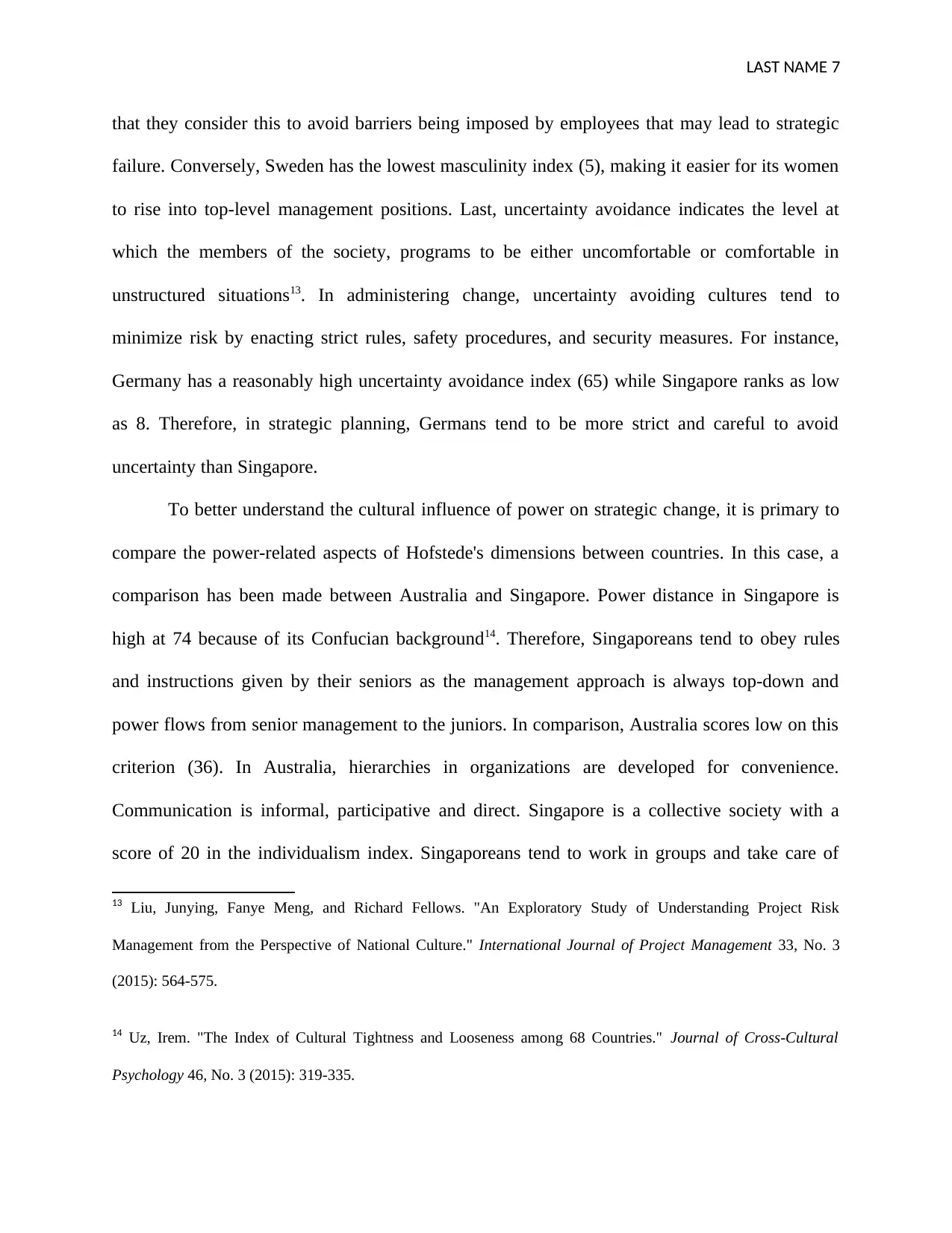
LAST NAME 7
that they consider this to avoid barriers being imposed by employees that may lead to strategic
failure. Conversely, Sweden has the lowest masculinity index (5), making it easier for its women
to rise into top-level management positions. Last, uncertainty avoidance indicates the level at
which the members of the society, programs to be either uncomfortable or comfortable in
unstructured situations13. In administering change, uncertainty avoiding cultures tend to
minimize risk by enacting strict rules, safety procedures, and security measures. For instance,
Germany has a reasonably high uncertainty avoidance index (65) while Singapore ranks as low
as 8. Therefore, in strategic planning, Germans tend to be more strict and careful to avoid
uncertainty than Singapore.
To better understand the cultural influence of power on strategic change, it is primary to
compare the power-related aspects of Hofstede's dimensions between countries. In this case, a
comparison has been made between Australia and Singapore. Power distance in Singapore is
high at 74 because of its Confucian background14. Therefore, Singaporeans tend to obey rules
and instructions given by their seniors as the management approach is always top-down and
power flows from senior management to the juniors. In comparison, Australia scores low on this
criterion (36). In Australia, hierarchies in organizations are developed for convenience.
Communication is informal, participative and direct. Singapore is a collective society with a
score of 20 in the individualism index. Singaporeans tend to work in groups and take care of
13 Liu, Junying, Fanye Meng, and Richard Fellows. "An Exploratory Study of Understanding Project Risk
Management from the Perspective of National Culture." International Journal of Project Management 33, No. 3
(2015): 564-575.
14 Uz, Irem. "The Index of Cultural Tightness and Looseness among 68 Countries." Journal of Cross-Cultural
Psychology 46, No. 3 (2015): 319-335.
that they consider this to avoid barriers being imposed by employees that may lead to strategic
failure. Conversely, Sweden has the lowest masculinity index (5), making it easier for its women
to rise into top-level management positions. Last, uncertainty avoidance indicates the level at
which the members of the society, programs to be either uncomfortable or comfortable in
unstructured situations13. In administering change, uncertainty avoiding cultures tend to
minimize risk by enacting strict rules, safety procedures, and security measures. For instance,
Germany has a reasonably high uncertainty avoidance index (65) while Singapore ranks as low
as 8. Therefore, in strategic planning, Germans tend to be more strict and careful to avoid
uncertainty than Singapore.
To better understand the cultural influence of power on strategic change, it is primary to
compare the power-related aspects of Hofstede's dimensions between countries. In this case, a
comparison has been made between Australia and Singapore. Power distance in Singapore is
high at 74 because of its Confucian background14. Therefore, Singaporeans tend to obey rules
and instructions given by their seniors as the management approach is always top-down and
power flows from senior management to the juniors. In comparison, Australia scores low on this
criterion (36). In Australia, hierarchies in organizations are developed for convenience.
Communication is informal, participative and direct. Singapore is a collective society with a
score of 20 in the individualism index. Singaporeans tend to work in groups and take care of
13 Liu, Junying, Fanye Meng, and Richard Fellows. "An Exploratory Study of Understanding Project Risk
Management from the Perspective of National Culture." International Journal of Project Management 33, No. 3
(2015): 564-575.
14 Uz, Irem. "The Index of Cultural Tightness and Looseness among 68 Countries." Journal of Cross-Cultural
Psychology 46, No. 3 (2015): 319-335.
Paraphrase This Document
Need a fresh take? Get an instant paraphrase of this document with our AI Paraphraser
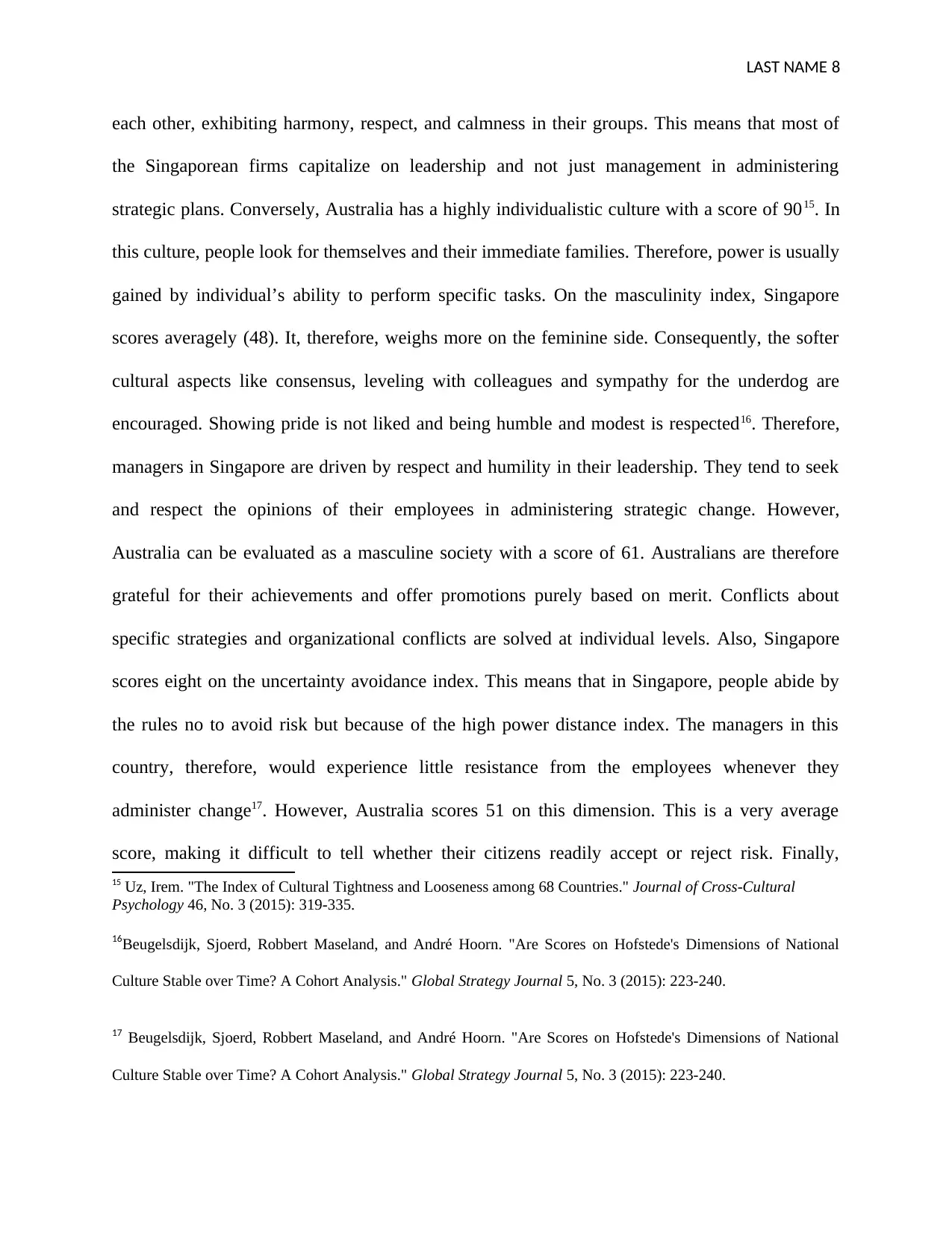
LAST NAME 8
each other, exhibiting harmony, respect, and calmness in their groups. This means that most of
the Singaporean firms capitalize on leadership and not just management in administering
strategic plans. Conversely, Australia has a highly individualistic culture with a score of 9015. In
this culture, people look for themselves and their immediate families. Therefore, power is usually
gained by individual’s ability to perform specific tasks. On the masculinity index, Singapore
scores averagely (48). It, therefore, weighs more on the feminine side. Consequently, the softer
cultural aspects like consensus, leveling with colleagues and sympathy for the underdog are
encouraged. Showing pride is not liked and being humble and modest is respected16. Therefore,
managers in Singapore are driven by respect and humility in their leadership. They tend to seek
and respect the opinions of their employees in administering strategic change. However,
Australia can be evaluated as a masculine society with a score of 61. Australians are therefore
grateful for their achievements and offer promotions purely based on merit. Conflicts about
specific strategies and organizational conflicts are solved at individual levels. Also, Singapore
scores eight on the uncertainty avoidance index. This means that in Singapore, people abide by
the rules no to avoid risk but because of the high power distance index. The managers in this
country, therefore, would experience little resistance from the employees whenever they
administer change17. However, Australia scores 51 on this dimension. This is a very average
score, making it difficult to tell whether their citizens readily accept or reject risk. Finally,
15 Uz, Irem. "The Index of Cultural Tightness and Looseness among 68 Countries." Journal of Cross-Cultural
Psychology 46, No. 3 (2015): 319-335.
16Beugelsdijk, Sjoerd, Robbert Maseland, and André Hoorn. "Are Scores on Hofstede's Dimensions of National
Culture Stable over Time? A Cohort Analysis." Global Strategy Journal 5, No. 3 (2015): 223-240.
17 Beugelsdijk, Sjoerd, Robbert Maseland, and André Hoorn. "Are Scores on Hofstede's Dimensions of National
Culture Stable over Time? A Cohort Analysis." Global Strategy Journal 5, No. 3 (2015): 223-240.
each other, exhibiting harmony, respect, and calmness in their groups. This means that most of
the Singaporean firms capitalize on leadership and not just management in administering
strategic plans. Conversely, Australia has a highly individualistic culture with a score of 9015. In
this culture, people look for themselves and their immediate families. Therefore, power is usually
gained by individual’s ability to perform specific tasks. On the masculinity index, Singapore
scores averagely (48). It, therefore, weighs more on the feminine side. Consequently, the softer
cultural aspects like consensus, leveling with colleagues and sympathy for the underdog are
encouraged. Showing pride is not liked and being humble and modest is respected16. Therefore,
managers in Singapore are driven by respect and humility in their leadership. They tend to seek
and respect the opinions of their employees in administering strategic change. However,
Australia can be evaluated as a masculine society with a score of 61. Australians are therefore
grateful for their achievements and offer promotions purely based on merit. Conflicts about
specific strategies and organizational conflicts are solved at individual levels. Also, Singapore
scores eight on the uncertainty avoidance index. This means that in Singapore, people abide by
the rules no to avoid risk but because of the high power distance index. The managers in this
country, therefore, would experience little resistance from the employees whenever they
administer change17. However, Australia scores 51 on this dimension. This is a very average
score, making it difficult to tell whether their citizens readily accept or reject risk. Finally,
15 Uz, Irem. "The Index of Cultural Tightness and Looseness among 68 Countries." Journal of Cross-Cultural
Psychology 46, No. 3 (2015): 319-335.
16Beugelsdijk, Sjoerd, Robbert Maseland, and André Hoorn. "Are Scores on Hofstede's Dimensions of National
Culture Stable over Time? A Cohort Analysis." Global Strategy Journal 5, No. 3 (2015): 223-240.
17 Beugelsdijk, Sjoerd, Robbert Maseland, and André Hoorn. "Are Scores on Hofstede's Dimensions of National
Culture Stable over Time? A Cohort Analysis." Global Strategy Journal 5, No. 3 (2015): 223-240.
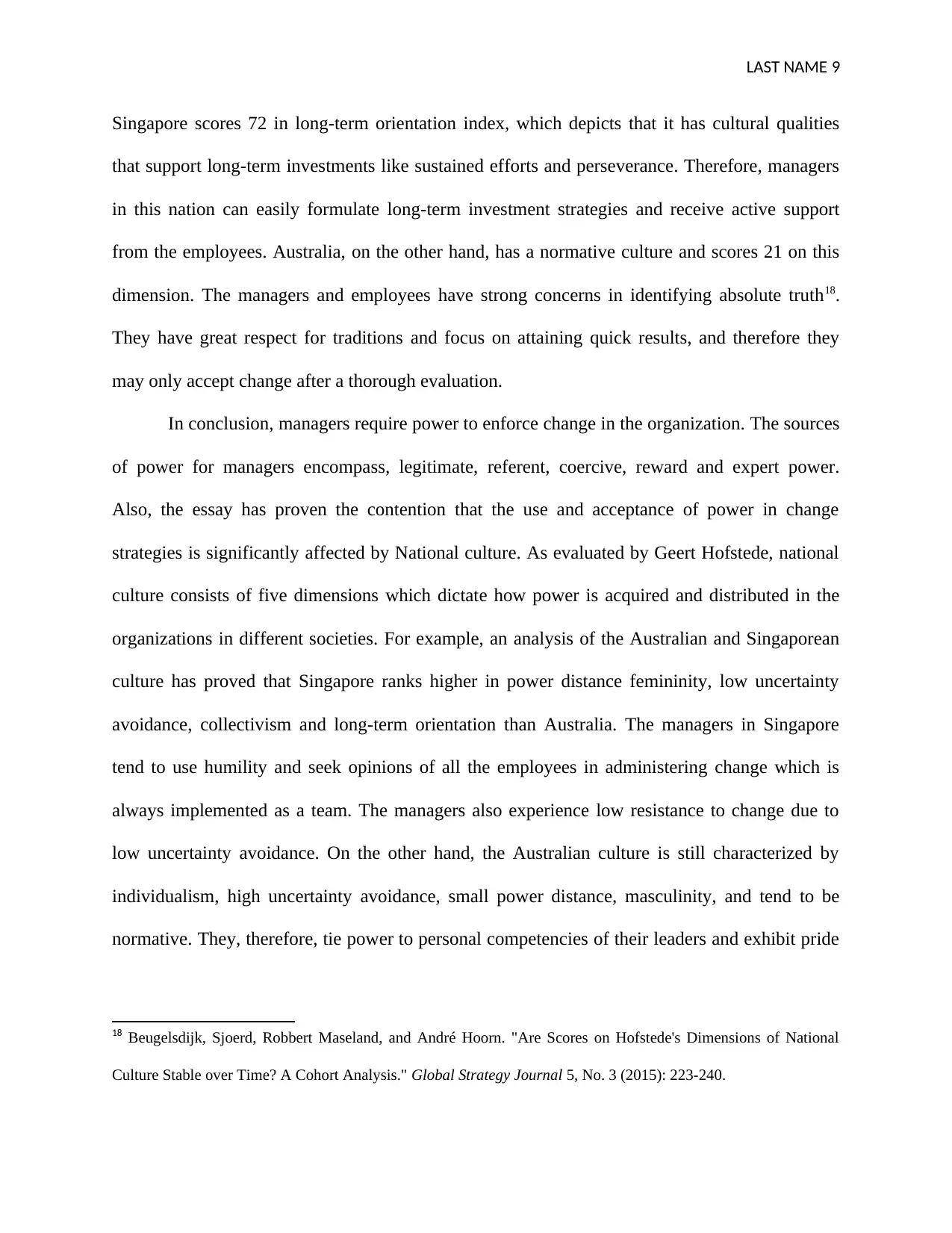
LAST NAME 9
Singapore scores 72 in long-term orientation index, which depicts that it has cultural qualities
that support long-term investments like sustained efforts and perseverance. Therefore, managers
in this nation can easily formulate long-term investment strategies and receive active support
from the employees. Australia, on the other hand, has a normative culture and scores 21 on this
dimension. The managers and employees have strong concerns in identifying absolute truth18.
They have great respect for traditions and focus on attaining quick results, and therefore they
may only accept change after a thorough evaluation.
In conclusion, managers require power to enforce change in the organization. The sources
of power for managers encompass, legitimate, referent, coercive, reward and expert power.
Also, the essay has proven the contention that the use and acceptance of power in change
strategies is significantly affected by National culture. As evaluated by Geert Hofstede, national
culture consists of five dimensions which dictate how power is acquired and distributed in the
organizations in different societies. For example, an analysis of the Australian and Singaporean
culture has proved that Singapore ranks higher in power distance femininity, low uncertainty
avoidance, collectivism and long-term orientation than Australia. The managers in Singapore
tend to use humility and seek opinions of all the employees in administering change which is
always implemented as a team. The managers also experience low resistance to change due to
low uncertainty avoidance. On the other hand, the Australian culture is still characterized by
individualism, high uncertainty avoidance, small power distance, masculinity, and tend to be
normative. They, therefore, tie power to personal competencies of their leaders and exhibit pride
18 Beugelsdijk, Sjoerd, Robbert Maseland, and André Hoorn. "Are Scores on Hofstede's Dimensions of National
Culture Stable over Time? A Cohort Analysis." Global Strategy Journal 5, No. 3 (2015): 223-240.
Singapore scores 72 in long-term orientation index, which depicts that it has cultural qualities
that support long-term investments like sustained efforts and perseverance. Therefore, managers
in this nation can easily formulate long-term investment strategies and receive active support
from the employees. Australia, on the other hand, has a normative culture and scores 21 on this
dimension. The managers and employees have strong concerns in identifying absolute truth18.
They have great respect for traditions and focus on attaining quick results, and therefore they
may only accept change after a thorough evaluation.
In conclusion, managers require power to enforce change in the organization. The sources
of power for managers encompass, legitimate, referent, coercive, reward and expert power.
Also, the essay has proven the contention that the use and acceptance of power in change
strategies is significantly affected by National culture. As evaluated by Geert Hofstede, national
culture consists of five dimensions which dictate how power is acquired and distributed in the
organizations in different societies. For example, an analysis of the Australian and Singaporean
culture has proved that Singapore ranks higher in power distance femininity, low uncertainty
avoidance, collectivism and long-term orientation than Australia. The managers in Singapore
tend to use humility and seek opinions of all the employees in administering change which is
always implemented as a team. The managers also experience low resistance to change due to
low uncertainty avoidance. On the other hand, the Australian culture is still characterized by
individualism, high uncertainty avoidance, small power distance, masculinity, and tend to be
normative. They, therefore, tie power to personal competencies of their leaders and exhibit pride
18 Beugelsdijk, Sjoerd, Robbert Maseland, and André Hoorn. "Are Scores on Hofstede's Dimensions of National
Culture Stable over Time? A Cohort Analysis." Global Strategy Journal 5, No. 3 (2015): 223-240.
⊘ This is a preview!⊘
Do you want full access?
Subscribe today to unlock all pages.

Trusted by 1+ million students worldwide

LAST NAME 10
in their successes. They also rank intermediately in uncertainty avoidance making it difficult to
determine the amount of resistance the employees would pose on change.
in their successes. They also rank intermediately in uncertainty avoidance making it difficult to
determine the amount of resistance the employees would pose on change.
Paraphrase This Document
Need a fresh take? Get an instant paraphrase of this document with our AI Paraphraser
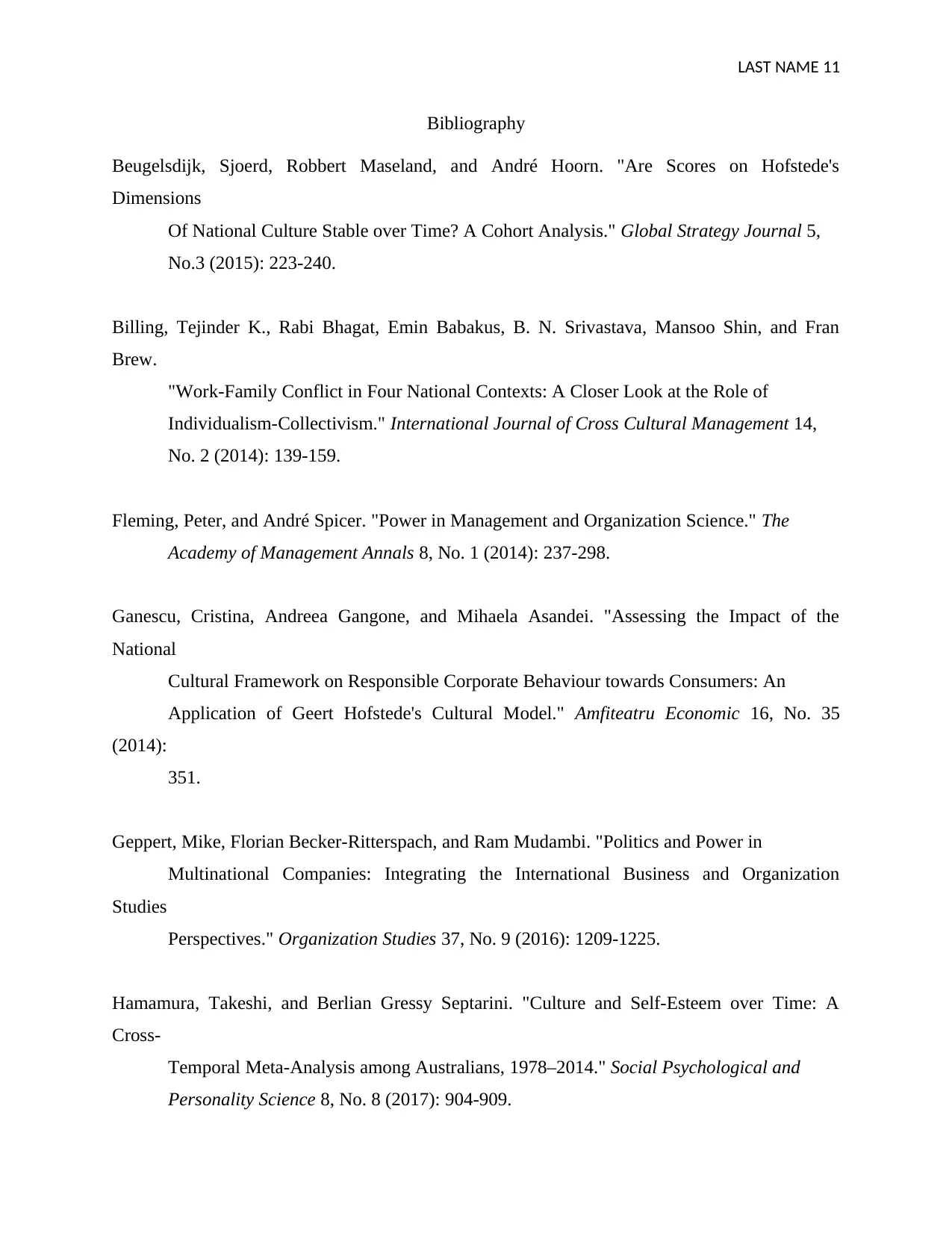
LAST NAME 11
Bibliography
Beugelsdijk, Sjoerd, Robbert Maseland, and André Hoorn. "Are Scores on Hofstede's
Dimensions
Of National Culture Stable over Time? A Cohort Analysis." Global Strategy Journal 5,
No.3 (2015): 223-240.
Billing, Tejinder K., Rabi Bhagat, Emin Babakus, B. N. Srivastava, Mansoo Shin, and Fran
Brew.
"Work-Family Conflict in Four National Contexts: A Closer Look at the Role of
Individualism-Collectivism." International Journal of Cross Cultural Management 14,
No. 2 (2014): 139-159.
Fleming, Peter, and André Spicer. "Power in Management and Organization Science." The
Academy of Management Annals 8, No. 1 (2014): 237-298.
Ganescu, Cristina, Andreea Gangone, and Mihaela Asandei. "Assessing the Impact of the
National
Cultural Framework on Responsible Corporate Behaviour towards Consumers: An
Application of Geert Hofstede's Cultural Model." Amfiteatru Economic 16, No. 35
(2014):
351.
Geppert, Mike, Florian Becker-Ritterspach, and Ram Mudambi. "Politics and Power in
Multinational Companies: Integrating the International Business and Organization
Studies
Perspectives." Organization Studies 37, No. 9 (2016): 1209-1225.
Hamamura, Takeshi, and Berlian Gressy Septarini. "Culture and Self-Esteem over Time: A
Cross-
Temporal Meta-Analysis among Australians, 1978–2014." Social Psychological and
Personality Science 8, No. 8 (2017): 904-909.
Bibliography
Beugelsdijk, Sjoerd, Robbert Maseland, and André Hoorn. "Are Scores on Hofstede's
Dimensions
Of National Culture Stable over Time? A Cohort Analysis." Global Strategy Journal 5,
No.3 (2015): 223-240.
Billing, Tejinder K., Rabi Bhagat, Emin Babakus, B. N. Srivastava, Mansoo Shin, and Fran
Brew.
"Work-Family Conflict in Four National Contexts: A Closer Look at the Role of
Individualism-Collectivism." International Journal of Cross Cultural Management 14,
No. 2 (2014): 139-159.
Fleming, Peter, and André Spicer. "Power in Management and Organization Science." The
Academy of Management Annals 8, No. 1 (2014): 237-298.
Ganescu, Cristina, Andreea Gangone, and Mihaela Asandei. "Assessing the Impact of the
National
Cultural Framework on Responsible Corporate Behaviour towards Consumers: An
Application of Geert Hofstede's Cultural Model." Amfiteatru Economic 16, No. 35
(2014):
351.
Geppert, Mike, Florian Becker-Ritterspach, and Ram Mudambi. "Politics and Power in
Multinational Companies: Integrating the International Business and Organization
Studies
Perspectives." Organization Studies 37, No. 9 (2016): 1209-1225.
Hamamura, Takeshi, and Berlian Gressy Septarini. "Culture and Self-Esteem over Time: A
Cross-
Temporal Meta-Analysis among Australians, 1978–2014." Social Psychological and
Personality Science 8, No. 8 (2017): 904-909.
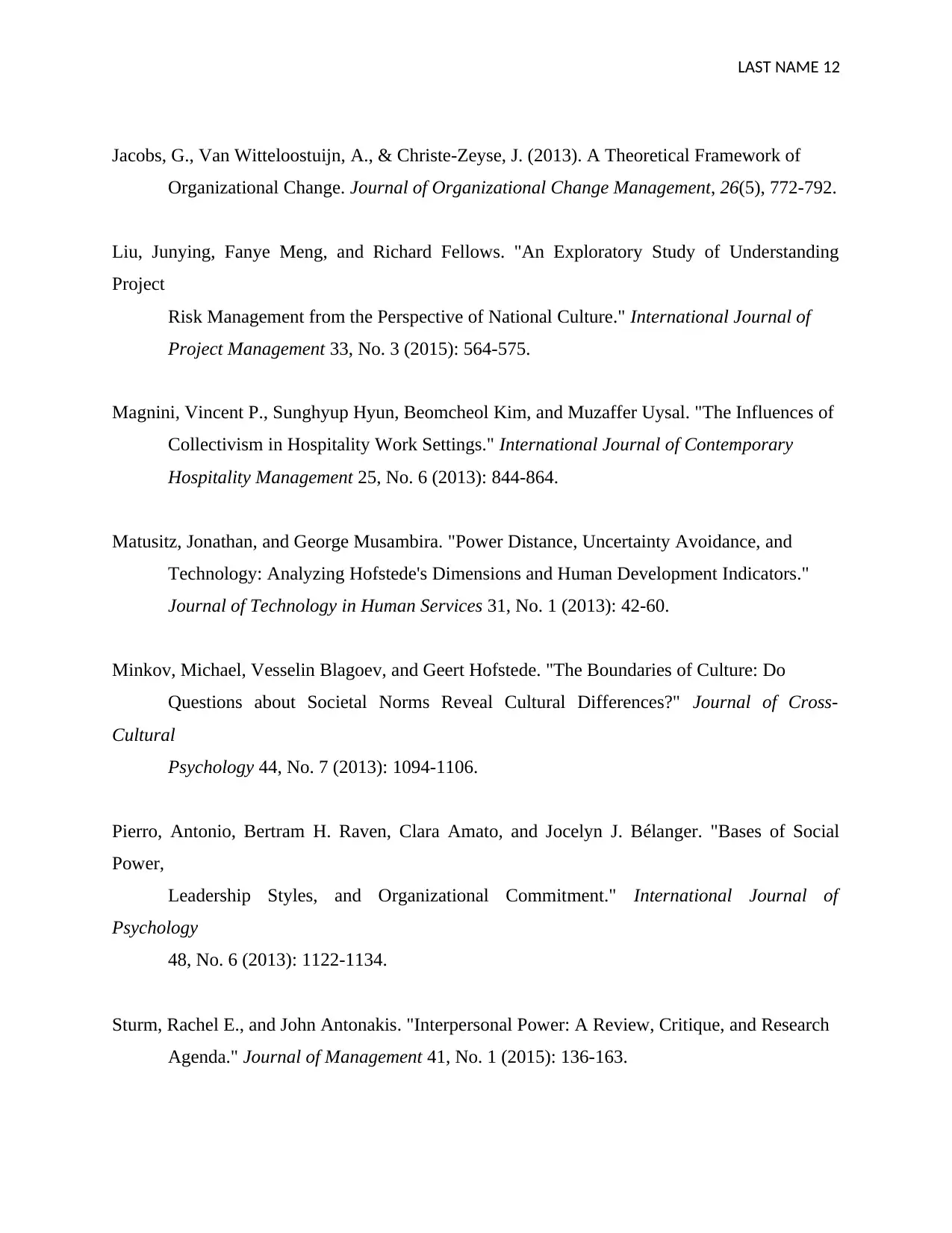
LAST NAME 12
Jacobs, G., Van Witteloostuijn, A., & Christe-Zeyse, J. (2013). A Theoretical Framework of
Organizational Change. Journal of Organizational Change Management, 26(5), 772-792.
Liu, Junying, Fanye Meng, and Richard Fellows. "An Exploratory Study of Understanding
Project
Risk Management from the Perspective of National Culture." International Journal of
Project Management 33, No. 3 (2015): 564-575.
Magnini, Vincent P., Sunghyup Hyun, Beomcheol Kim, and Muzaffer Uysal. "The Influences of
Collectivism in Hospitality Work Settings." International Journal of Contemporary
Hospitality Management 25, No. 6 (2013): 844-864.
Matusitz, Jonathan, and George Musambira. "Power Distance, Uncertainty Avoidance, and
Technology: Analyzing Hofstede's Dimensions and Human Development Indicators."
Journal of Technology in Human Services 31, No. 1 (2013): 42-60.
Minkov, Michael, Vesselin Blagoev, and Geert Hofstede. "The Boundaries of Culture: Do
Questions about Societal Norms Reveal Cultural Differences?" Journal of Cross-
Cultural
Psychology 44, No. 7 (2013): 1094-1106.
Pierro, Antonio, Bertram H. Raven, Clara Amato, and Jocelyn J. Bélanger. "Bases of Social
Power,
Leadership Styles, and Organizational Commitment." International Journal of
Psychology
48, No. 6 (2013): 1122-1134.
Sturm, Rachel E., and John Antonakis. "Interpersonal Power: A Review, Critique, and Research
Agenda." Journal of Management 41, No. 1 (2015): 136-163.
Jacobs, G., Van Witteloostuijn, A., & Christe-Zeyse, J. (2013). A Theoretical Framework of
Organizational Change. Journal of Organizational Change Management, 26(5), 772-792.
Liu, Junying, Fanye Meng, and Richard Fellows. "An Exploratory Study of Understanding
Project
Risk Management from the Perspective of National Culture." International Journal of
Project Management 33, No. 3 (2015): 564-575.
Magnini, Vincent P., Sunghyup Hyun, Beomcheol Kim, and Muzaffer Uysal. "The Influences of
Collectivism in Hospitality Work Settings." International Journal of Contemporary
Hospitality Management 25, No. 6 (2013): 844-864.
Matusitz, Jonathan, and George Musambira. "Power Distance, Uncertainty Avoidance, and
Technology: Analyzing Hofstede's Dimensions and Human Development Indicators."
Journal of Technology in Human Services 31, No. 1 (2013): 42-60.
Minkov, Michael, Vesselin Blagoev, and Geert Hofstede. "The Boundaries of Culture: Do
Questions about Societal Norms Reveal Cultural Differences?" Journal of Cross-
Cultural
Psychology 44, No. 7 (2013): 1094-1106.
Pierro, Antonio, Bertram H. Raven, Clara Amato, and Jocelyn J. Bélanger. "Bases of Social
Power,
Leadership Styles, and Organizational Commitment." International Journal of
Psychology
48, No. 6 (2013): 1122-1134.
Sturm, Rachel E., and John Antonakis. "Interpersonal Power: A Review, Critique, and Research
Agenda." Journal of Management 41, No. 1 (2015): 136-163.
⊘ This is a preview!⊘
Do you want full access?
Subscribe today to unlock all pages.

Trusted by 1+ million students worldwide
1 out of 13
Related Documents
Your All-in-One AI-Powered Toolkit for Academic Success.
+13062052269
info@desklib.com
Available 24*7 on WhatsApp / Email
![[object Object]](/_next/static/media/star-bottom.7253800d.svg)
Unlock your academic potential
Copyright © 2020–2026 A2Z Services. All Rights Reserved. Developed and managed by ZUCOL.





